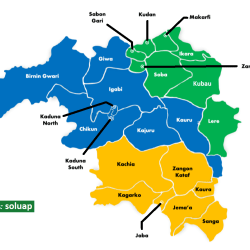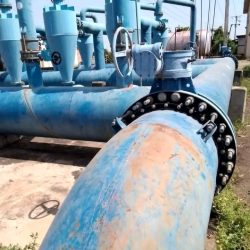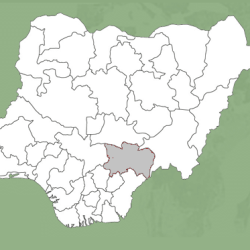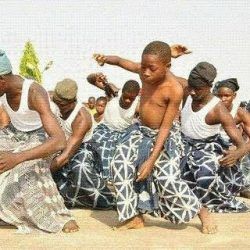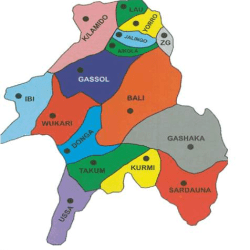List of Tiv villages in Taraba State that were abandoned following the outbreak of violent conflict between the Jukun and Tiv ethnic groups, which began on April 1, 2019.
The original inhabitants—bona fide Tiv indigenes— representing an estimated population of over 210,000 people were forced to flee their ancestral homes due to the widespread violence and destruction.
These villages remain deserted, with many homes burnt, properties looted, and the people displaced, living in various Internally Displaced Persons (IDP) camps or host communities.
List of Deserted Tiv Villages in Wukari LGA
A. RAFINKADA WARD
- Tse shisha
2.Tse Aborgor
3.Tse Yawe - Mbaadega Akaabo
- Tor iyorshagher
- Chia aminde
- Iwambe Alakari
- Tse Nyam
- Tse Hamber
10.Tse Alakari - Chia Ahange
- Tse Kundi
- Igbudu begha
- Ikyaayar
- Ihulen gbugba
- Tse wase
- Tse Haayongo
- Tse Amonko
- Tse Msaar
- Iwev Abon
- Tse-Atsenga
- Tse Luka
- Aso Azege
B. KENTE WARD
- Sontyo
2.Tse-Amenger - Sev-av
- Tse -Tamen
- Tse-Kum
- Tse-Ayegher
- Tse-Ayem
- Tse-Avyoko
- Tse-Mbaakaa
- Tse-Nember
- Mueikyuna
- Tse-Avaan
- Tse- Sharegh
- Tse-Achamber
- Tse-Inja
- Tse-Wende
- Gboughkya
- Tse-Humbe
- Tse-Sur
- Shausu
- Tse-Gbaa
- Tse-Oradi
- Tse-Teior
- Tse-Adaa
- Tse-Akwaya 2
- Tse-Iorver 2
- Tse-Leva
- Tse-Gbyorda
- Wachin
- Tse-Gyô
- Tse-Orabende
- Tse-Tar
- Demelu
- Tse-Agan
- Tse-Shausu
- Tse-Abii
- Tse-Ayakume
- Tse-Adayôhôl
C. BANTAJE WARD
- Mbishu
- Tse Ikperen
- Aben
- Saamaaya
- Tse Uyoo
- Shakyo
- Ayaba
- Uyôô
- Jingir
- Nege
- Tse Apa
- Tse Ager
- Bantaje
- Angwan Tiv
- Mahanga 1 Angwan Tiv
- Mahanga 2 Angwan Tiv
- Chediya 1 Angwan Tiv
- Chediya 2 Angwan Tiv
- Zendesha
- Ugber
- Haruna A
Tiv People in Taraba
The Tiv people are one of the largest ethnic groups in central Nigeria, with a population estimated at over seven million. Predominantly found in Benue State, substantial Tiv communities also live in Taraba, Nasarawa, and Plateau States. They are known for their rich cultural heritage, strong communal ties, and agricultural expertise. Tiv language, known as “Tiv,” is spoken across their communities and serves as a unifying factor.
Historically, the Tiv people have lived in decentralized, clan-based communities. Leadership is exercised through a council of elders, with significant respect given to age and wisdom. Their oral traditions, folktales, and dances reflect a deep sense of identity and continuity.
Tiv Migration into Taraba State
Tiv migration into Taraba State, particularly into southern LGAs like Wukari, Donga, Takum, and Ibi, occurred over many decades, notably during the colonial and early post-independence periods. Drawn by the fertile lands and peaceful surroundings, Tiv settlers established vibrant agricultural communities. This migration was primarily peaceful, driven by economic reasons—most Tiv migrants were farmers looking for arable land.
By the mid-20th century, entire villages had formed, complete with schools, churches, and local markets. The Tiv in Taraba became deeply integrated into the region’s economic and social fabric.
Cultural Identity and Traditions
The Tiv in Taraba retain their distinct identity:
- Language: The Tiv language is widely spoken in homes and churches, ensuring cultural preservation.
- Farming Practices: Known for producing yam, maize, rice, and cassava, Tiv farmers contribute significantly to Taraba’s agricultural economy.
- Social Structure: Clan lineage and communal decision-making are vital. Festivals like Kwagh-Hir (puppet theatre) and marriage rites reinforce traditional values.
Geographic Spread in Taraba
The Tiv population is concentrated in the following LGAs:
- Wukari LGA – notably in Rafinkada, Kente, and Bantaje wards.
- Donga LGA
- Takum LGA
- Ibi LGA
Dozens of Tiv villages once thrived in these areas until they were tragically deserted due to violent ethnic conflicts.
Coexistence with Other Ethnic Groups
Historically, the Tiv coexisted with neighboring groups such as the Jukun, Kuteb, and Chamba. Inter-ethnic marriages, trade partnerships, and shared cultural events were common. However, tensions over land rights, political representation, and perceived marginalization periodically disrupted these relationships.
The Jukun-Tiv Conflict Explained
The conflict between the Jukun and Tiv communities has deep historical roots, often ignited by:
- Land ownership disputes
- Political underrepresentation
- Ethnic mistrust
Since the 1990s, sporadic violence has erupted, leading to deaths, displacement, and the destruction of entire villages.
2019 Wukari Violence & Aftermath
On April 1, 2019, renewed violence between Tiv and Jukun communities in Wukari LGA escalated into a humanitarian crisis. More than 100 Tiv villages were burned or abandoned, including Tse Shisha, Tse Yawe, and Mbaadega Akaabo. Over 210,000 Tiv indigenes were displaced, most now residing in IDP camps across Benue and Nasarawa States.
This conflict not only disrupted daily life but also shattered inter-communal trust, with many homes and properties destroyed beyond repair.

Internally Displaced Persons (IDPs)
Tiv IDPs in Taraba State and neighboring areas face extreme challenges:
- Overcrowded camps
- Lack of food, clean water, and education
- High rates of trauma and depression
Organizations like Doctors Without Borders and Red Cross have intervened, but support remains limited.
Government Response and Policy
Despite repeated calls, the Taraba State Government’s response has been widely criticized for:
- Slow or no acknowledgment of Tiv settlements
- Failure to guarantee safe return
- Inadequate compensation for losses
At the federal level, appeals have been made in the National Assembly to investigate and resolve the crisis, but meaningful progress remains elusive.
Advocacy and Human Rights Issues
Activists such as Mr. Achibo Peters Achibo have become prominent voices advocating for the rights of Tiv communities in Taraba. Their efforts to speak truth to power have often been met with threats and intimidation. Civil society organizations and human rights defenders continue to demand recognition, resettlement, and justice.
Documenting the Deserted Villages
Evidence exists proving the historical and present-day existence of these villages:
- Community registers
- Satellite images
- Eyewitness accounts
A detailed list includes settlements in Rafinkada, Kente, and Bantaje, such as Tse Aborgor, Tse-Kundi, Sontyo, Tse-Achamber, Mbishu, and Ayaba. These are not empty names—they are ancestral homes.
The Struggle for Political Inclusion
Tiv communities in Taraba often feel excluded from political processes:
- Lack of elected representatives
- Exclusion from local decision-making
- Voter disenfranchisement due to displacement
This marginalization has hindered effective dialogue and reconciliation.
Current Livelihoods and Challenges
Many Tiv people have been reduced to subsistence survival:
- Farmers fear returning to fields due to security risks
- Children miss years of schooling
- Women and youth face increased vulnerability
The Role of Religion in Unity
Faith communities—especially churches—have stepped in to offer hope. Through joint prayer sessions, counseling, and peacebuilding initiatives, religious leaders strive to bridge divides and rebuild trust among ethnic groups.
Media Narratives and Public Perception
Sadly, the media has often underreported the plight of the Tiv in Taraba. However, local community journalists and advocacy groups have begun to document stories and amplify voices, changing the narrative from invisibility to visibility.
Steps Toward Reconciliation
Peace is possible. Local efforts include:
- Community-led peace talks
- Mediation by traditional rulers
- Youth and women’s dialogue platforms
Reconciliation cannot occur without official acknowledgment of past atrocities and a sincere commitment to justice.
Future Outlook for Tiv in Taraba
Despite decades of conflict and marginalization, the Tiv people in Taraba remain resilient. With fair representation, recognition of ancestral lands, and government accountability, a peaceful and inclusive future is still within reach.
🙋♂️ Frequently Asked Questions (FAQs)
1. Are there Tiv people in Taraba State?
Yes, Tiv people have lived in Taraba State for decades, especially in southern LGAs like Wukari and Donga.
2. Why were Tiv villages in Wukari abandoned?
They were deserted following violent clashes with the Jukun in 2019, which led to mass displacement and destruction.
3. What is the current situation of Tiv IDPs?
Many live in IDP camps under difficult conditions, lacking access to basic services and security.
4. Is the government helping displaced Tiv communities?
Support has been limited and inconsistent. Many Tiv leaders and activists continue to call for more decisive action.
5. How can peace be restored between Tiv and Jukun communities?
Through honest dialogue, inclusive governance, and recognizing the rights of all affected communities.
6. What can be done to support the Tiv in Taraba?
Support can include advocacy, humanitarian aid, political representation, and public awareness of their plight.
